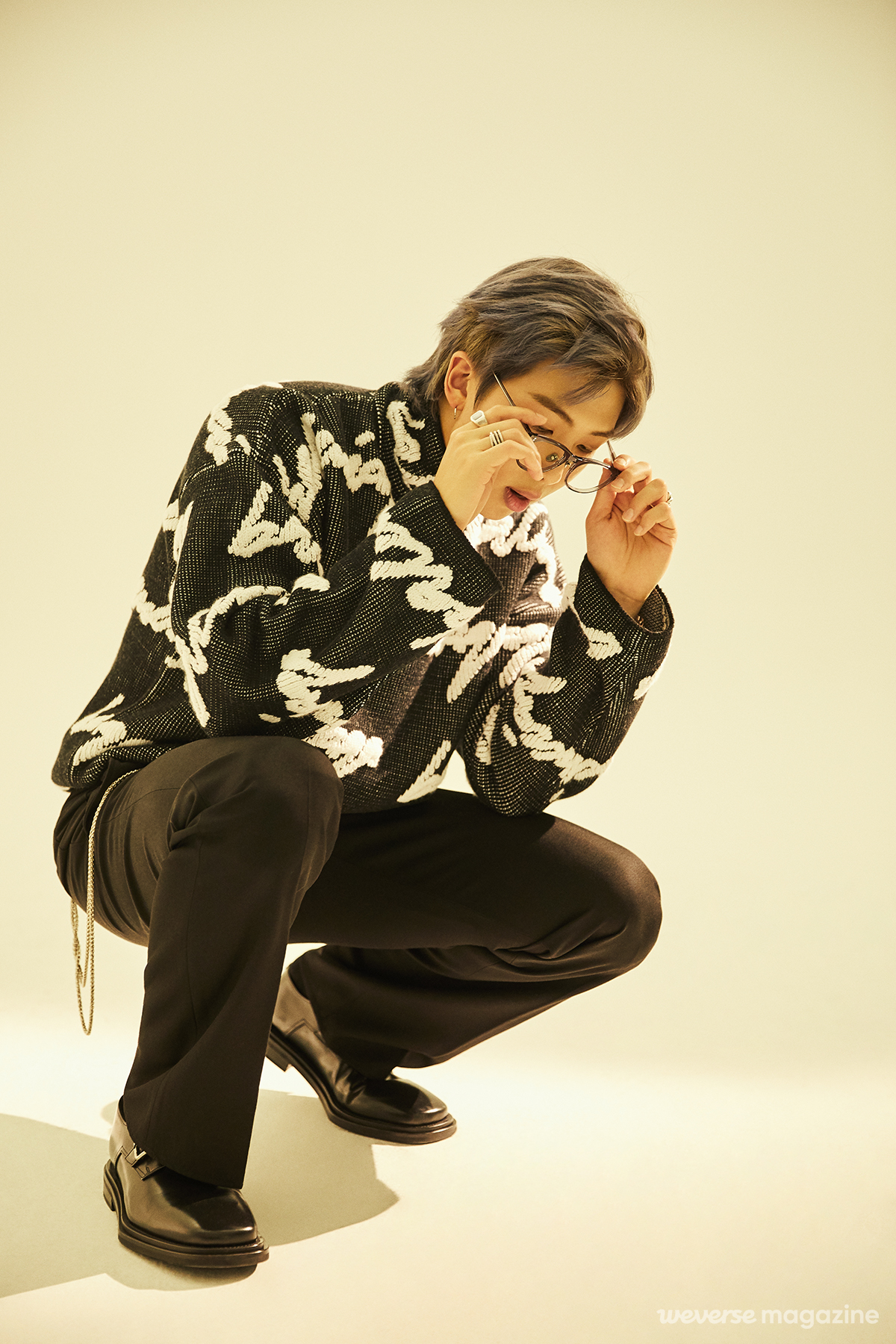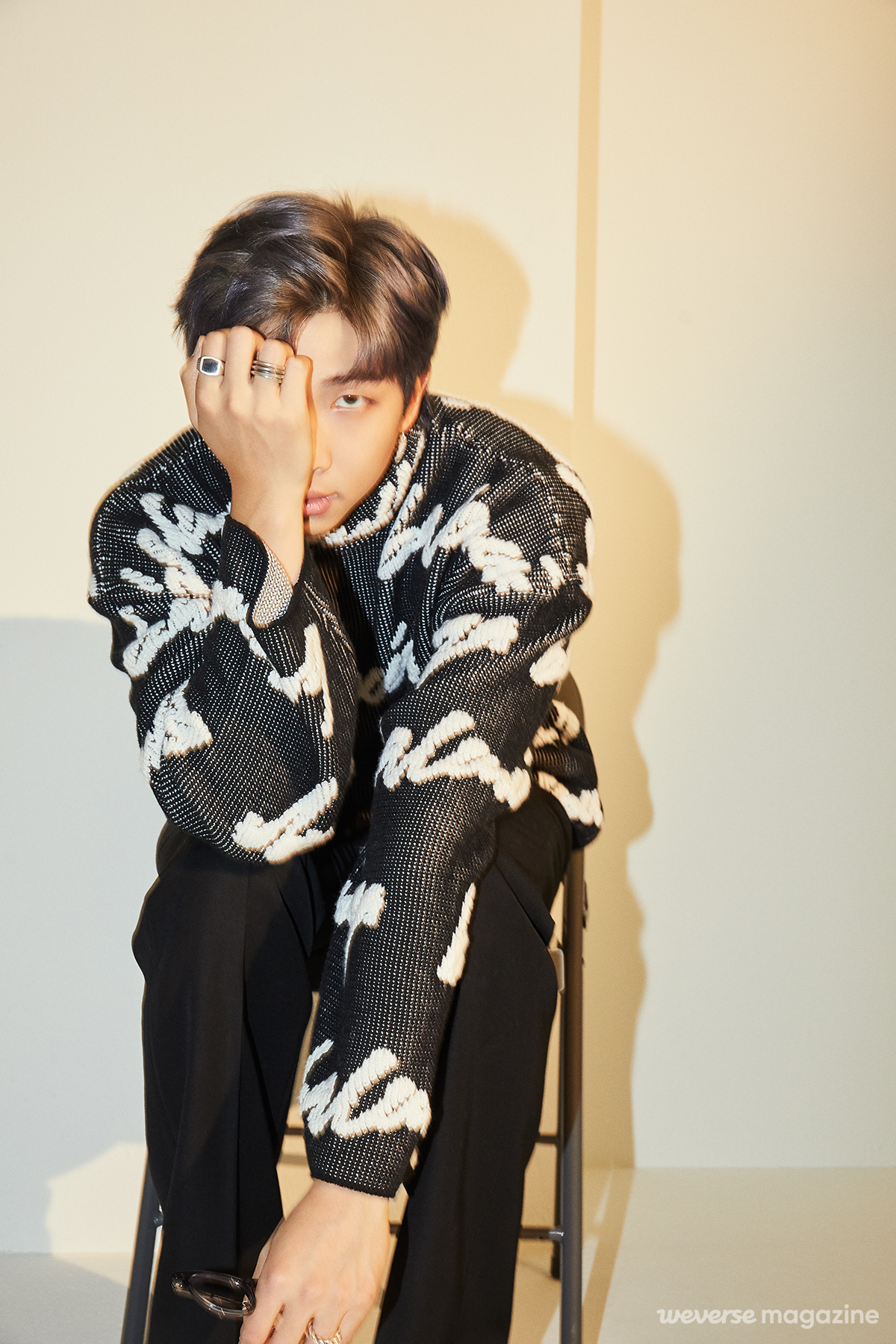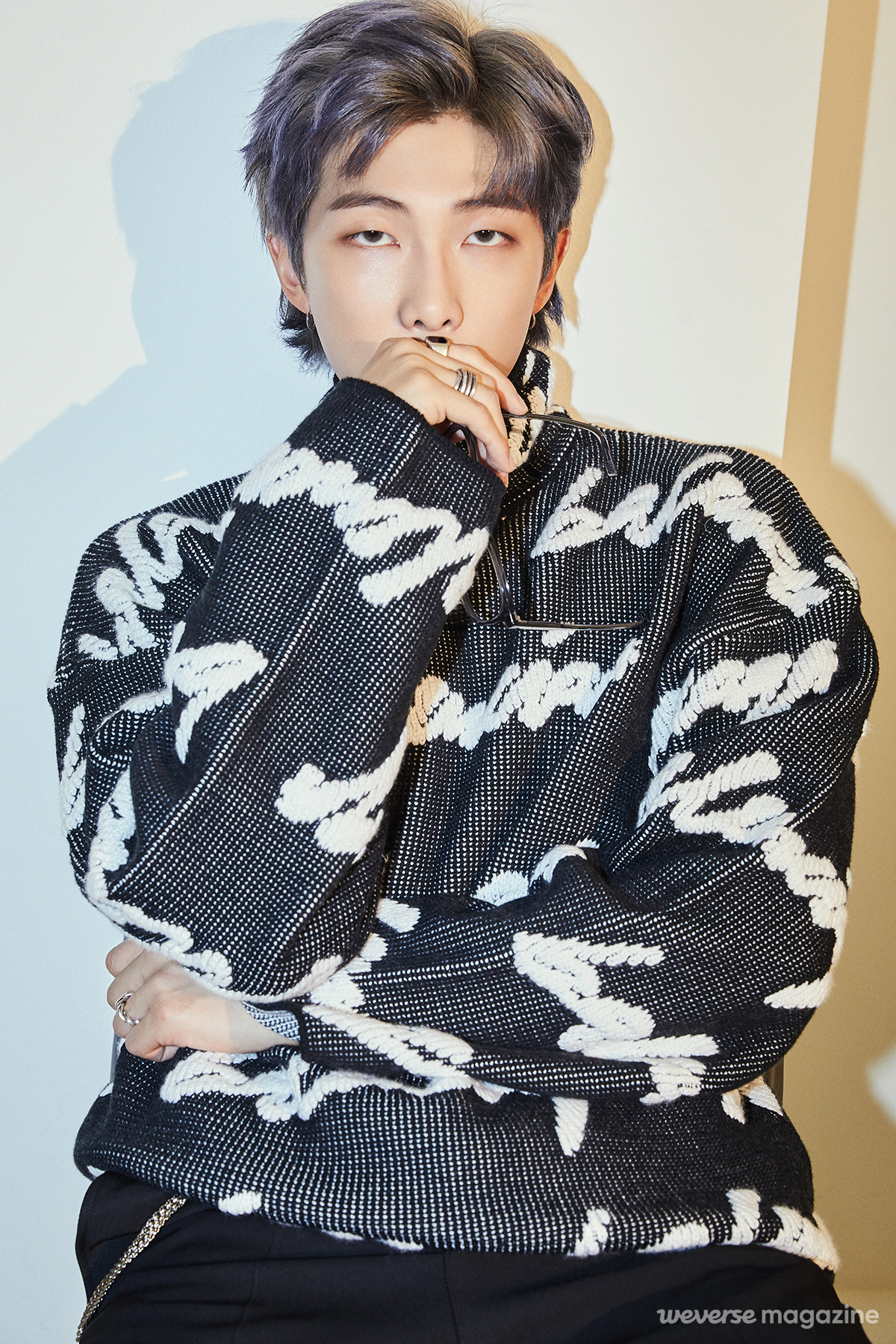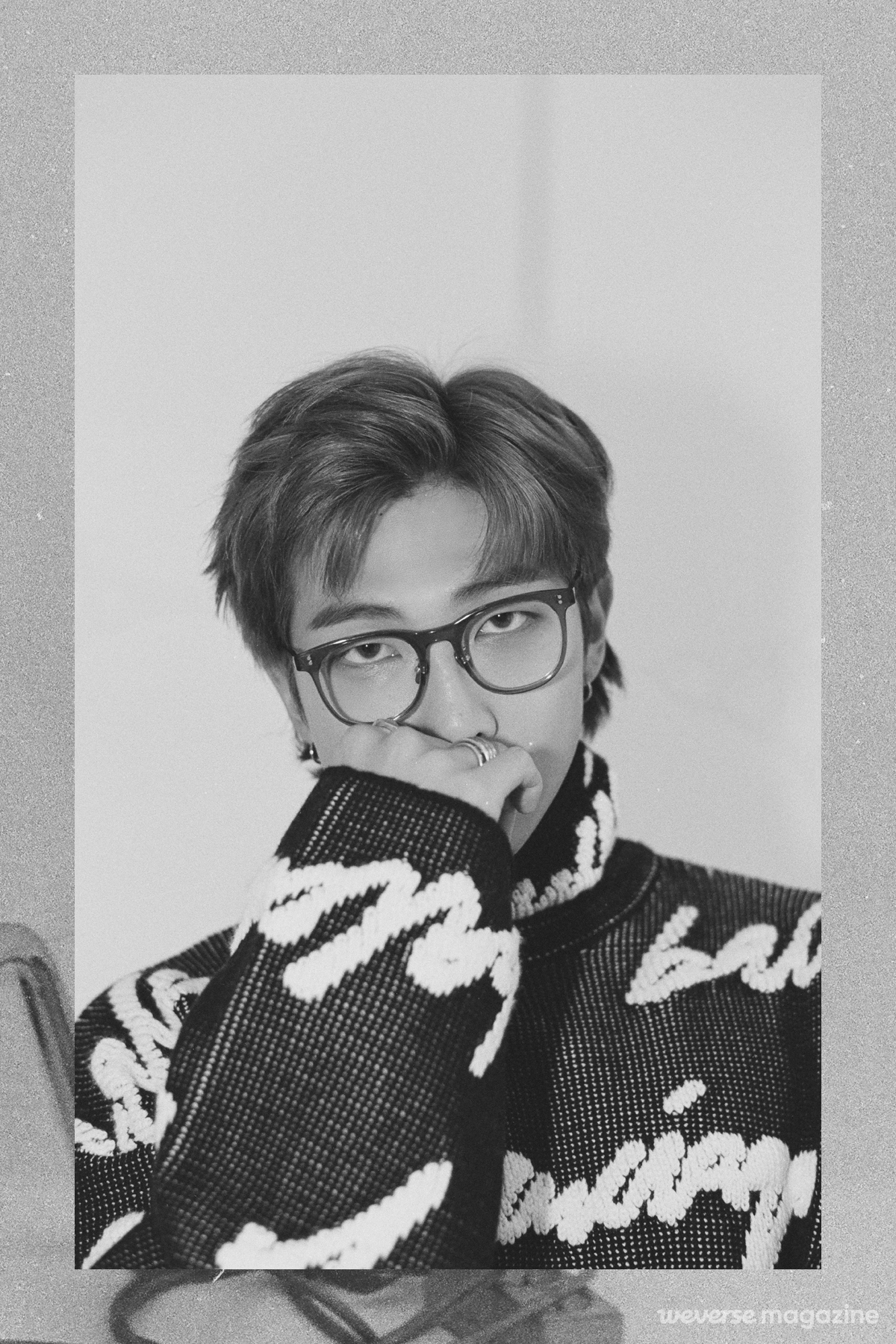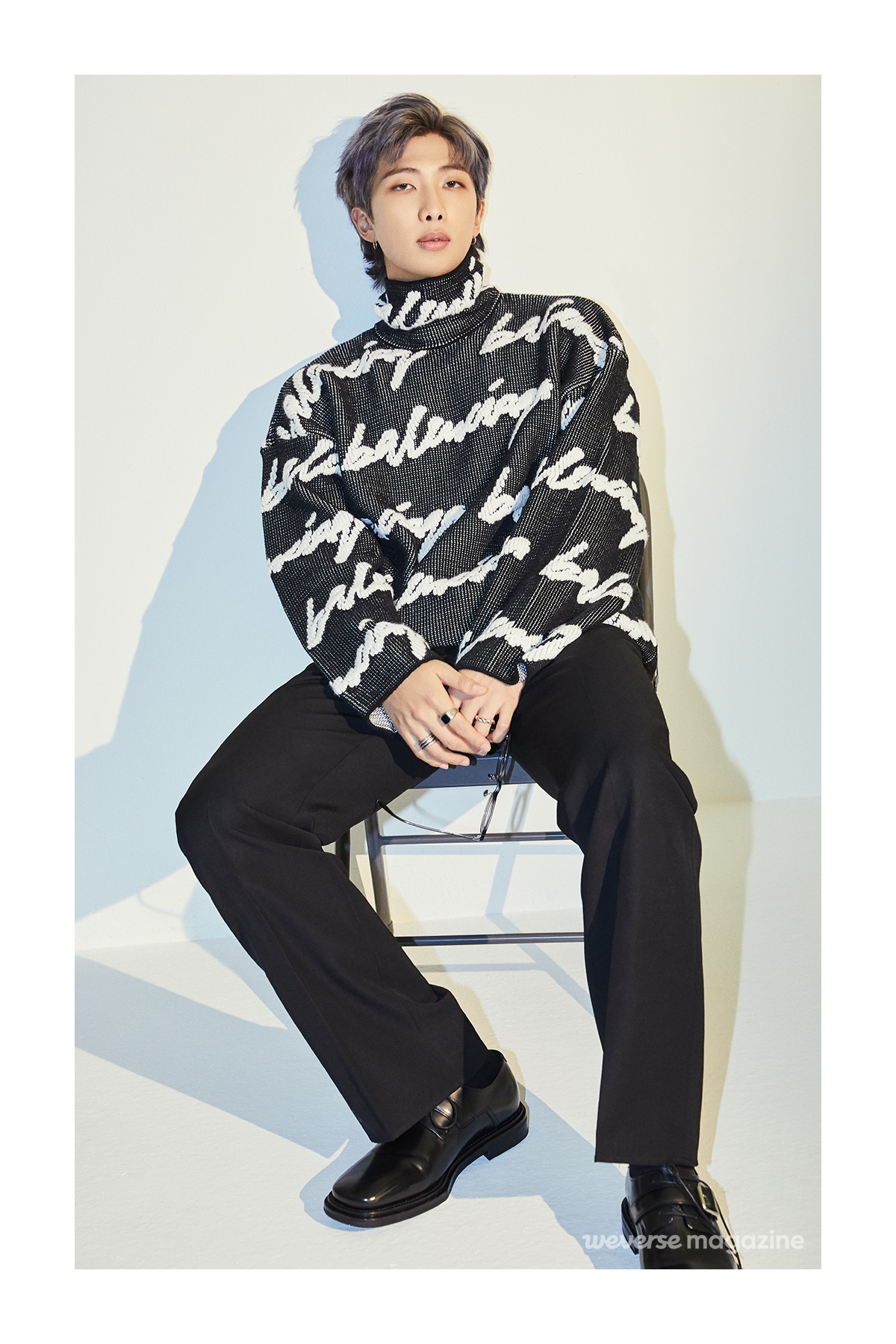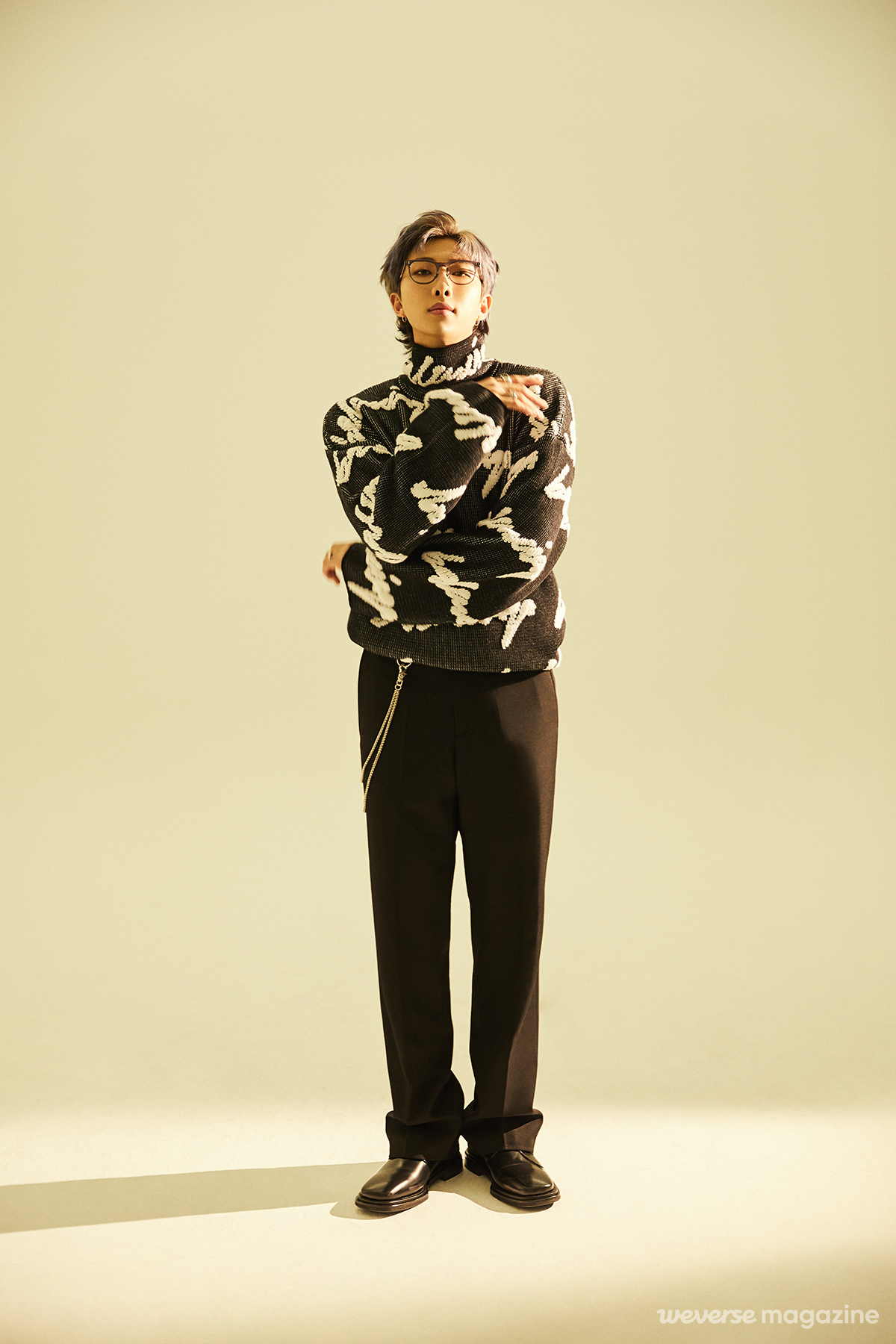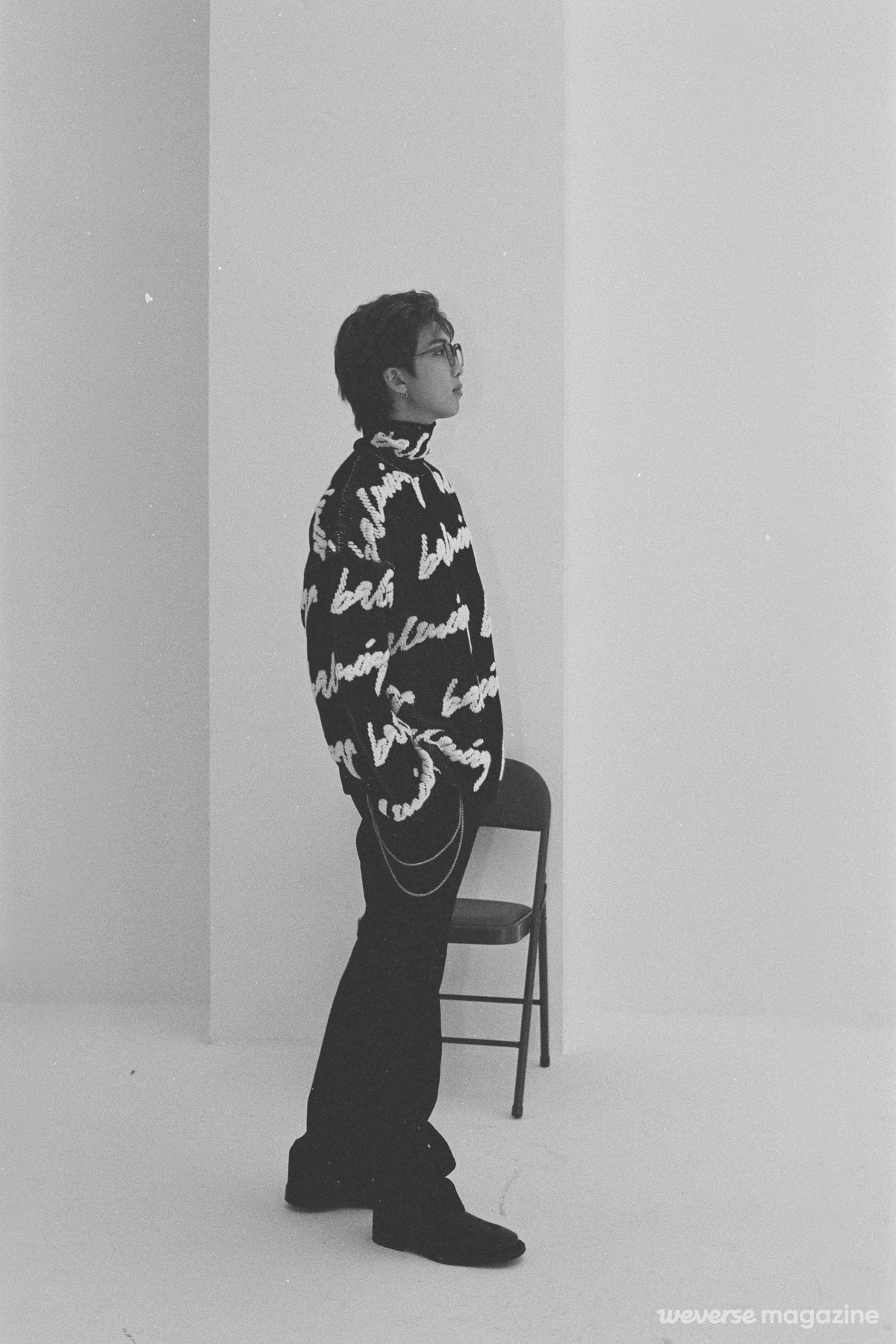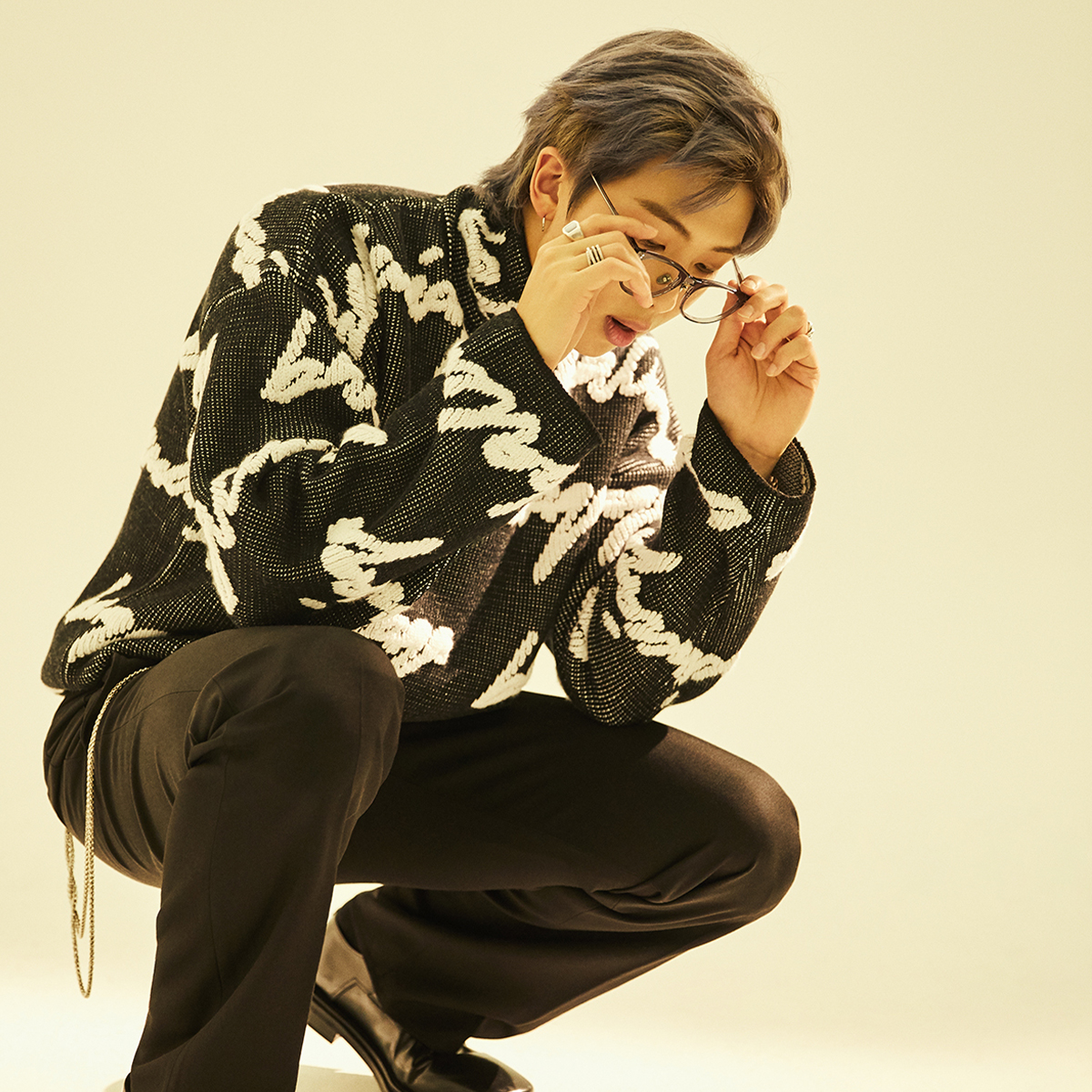
How do you feel about the unique approach you took to making your new album, BE?
RM: The other members were a ton of help to me. My lyrics made it on the album, but the music I composed didn’t, so I’m really thankful to the group for the music. How should I say this? I feel like everyone is doing a great job. There are so many parts in these songs that I’m indebted to them for. “Stay” was originally going to be the title song on Jung Kook’s mixtape, but everyone liked it so much, and they all agreed to put that on our album. That’s how much influence they had. I’m really happy my room idea was chosen to be the album photos. Since we’re spending a lot of time in our rooms because of COVID-19, we laid out the idea of each of us decorating a room in our own style. I can’t remember for sure (laughs) but I think I’m the one who came up with that. I made a comfortable room, one that’s modern and warm because that’s what I like.
There’s a painting in the middle, and symmetrically arranged figurines.
RM: The figures are from my own collection. I wanted to show one of my paintings, but that didn’t pan out. But still, those are the things I hold most dear to me right now, so I let the room embody the things I wish I had, too.
RM: Someone said, “You don’t have to buy this painting; it’s yours so long as you’re looking at it.” That’s my favorite sound bite these days. What I most envied about painters was that, even after they died, their work would be hanging up somewhere, maybe even in another country, still defining that space. Musicians leave behind their songs and videos, too, but it’s only through fine art that viewers in the future are able to completely meet artists from the past. I’m envious that this is only possible for painters. These days I’m trying to find spaces where I can have more relaxed viewing experiences.
There’s a full experience involved, from the time you get ready to leave your house until the time you’re actually looking at artwork in the gallery.
RM: That’s perfect to me. There’s art you can keep at home, and then there’s art that should always be viewed in museums.
What effect do you think that type of experience has on your music? You didn’t compose any of the songs but instead participated in writing the lyrics to all of the tracks. Did that experience affect your lyric writing in any way?
RM: I think it’s helped me develop a way of thinking using all the senses. I used to be attuned to speech and focus on language and auditory textures, but now I can look at my thoughts from many different angles. That’s why I spend more time studying art now. I’m waiting for the day that it all comes to the surface, like when you paint the base on a canvas over and over so the colors pop. It’s hard to answer in one word if it has a direct influence on my work, but I think people who create music develop a way of seeing the world through their personal experience and their creative process. Painters naturally exhibit their art over a very long period of time. I think it gave me an eye for looking at the world in one long, continuous stroke. So now it’s become a little challenging for me to write lyrics these days. I’ve become more cautious.
RM: I used to have so many ideas pouring out that it was hard to pluck one out. So I would stack them up like a Jenga tower and ponder over which one to remove. But now, it’s hard to even add a block to the stack. I’m not sure why but, when I look at these artists whose works span their entire lives, I sense that the rhythm of my creativity is slowing down more and more. That’s the source of my dilemma. I’m only 27 years old. I still need to wander around and get tripped up a little. But am I just trying to imitate what the fine artists are doing? Or maybe BTS experienced so much in the past seven years, that now it’s time for us to take a breather? I’ve got so many questions, I feel like my hair’s turning white. That’s why none of my songs are on the album. I wrote some, but they were too personal to use there. I don’t exactly like myself like this, but I have to see through to the end in this direction and find the answer.
Maybe for that reason, your rapping has shifted focus to the lyrics more so than trend or musicality. It emphasizes the feeling of the words over a particular format or beat.
RM: Exactly. In—was it 2017? Pdogg was talking to Yoongi, Hobi and me about our style, and said, “Namjoon, it feels like you’re becoming a lyricist,” and it really stuck with me. I have a lot of thoughts lately when I watch Show Me the Money or listen to hip hop songs from the Billboard chart. My music started out all about my life as a rapper, so I spend a lot of time thinking about where I am now.
So you’ve started to ask yourself who you are as a musician?
RM: I listened to Lee So-ra’s seventh album again today. I keep changing my mind but, if I had to pick between her sixth and seventh album, I like her seventh a little more. And then I listen to the most popular songs on Billboard, and I feel kind of thrown off. Um … There’s something Whanki Kim said that’s been running around in my head lately: After moving to New York, he embraced the style of artists like Mark Rothko and Adolf Gottlieb, but then he said, “I’m Korean, and I can’t do anything not Korean. I can’t do anything apart from this, because I am an outsider.” And I keep thinking that way, too. That’s my main concern lately.
RM: The sound has to fit with the whole album so I couldn’t incorporate that feel into BTS songs, but the songs I’m listening to most lately have been Korean. Songs like P-Type’s “Don Quixote,” Dead’P’s “Spread My Wings,” Soul Company’s album The Bangerz. The impressions the songs from back then have left on me, the lyrics from back then and the lyrics from now, they’re different. So BE is both Korean and pop; it’s very unique, in my view.
I think that’s especially true for “Life Goes On.” It’s got a pop melody, but compared to “Dynamite,” it has a very different feel. It doesn’t slip deep into the sentimental, instead allowing the melody to flow naturally.
RM: Exactly. The chorus is totally pop, and one of the writers was also American. But the song doesn’t really follow American music trends, weirdly. So I don’t know how “Life Goes On” is going to be received. It’s really calm, almost contemplative. So there’s lyrics, like, “Like an echo in the forest,” and, “Like an arrow in the blue sky.” The song kind of feels like that: It could just float off and disappear. It might even come off as bland next to “Dynamite.”
If nothing else, it seems the song will stick around for a long time. Maybe kids now will listen to it later on in the future.
RM: I hope so. That’s the one thing I really hope for, people in the future, thinking back and saying, “Oh, right! Remember that one song?” That’s what my favorite artists and other people who leave a lasting impression on me have in common. One thing common among the songs that have affected me a lot, like Lee So-ra’s seventh album, is that the lyrics they utter in their voice along with the overall sound stick with me. I hope when people look back, my words uttered with the sound of my voice, echoes for a long time in an auditory or visual way, or even throughout their entire lives. But that’s the dilemma: We have all these bling-bling symbols of our success, but we’re not that kind of team.
RM: I was the first one to check our position (laughs) but I didn’t want to get too excited about it. I was scared of facing disappointment so I put the brakes on out of habit, and restrained myself. But on the other hand, I feel like I should relish this moment. This is a once-in-a-lifetime thing; shouldn’t I enjoy myself a bit? But I disliked that sensation of only feeling elated so I tried to be as objective as possible. I was just one small part of everything that made this happen.
It reminds me of that part, “Running faster than that cloud of rain / Thought that would be enough / Guess I’m only human after all,” from “Life Goes On.”
RM: “Only human” sounds so appropriate for me right now. One time, I saw a dark cloud over the N Seoul Tower while I was walking along the Han River. I was with a friend and we talked about where the border between where it’s raining and where it’s not might be, and suddenly, we came up with the idea to run and find that spot. But after running for 10 minutes, the cloud was even further away than it had been. At that moment, the puzzle pieces snapped into place. You think you can go faster than that dark cloud? No. That’s what I realized then. And I just like what Whanki Kim said, that maybe I can’t do anything not Korean, because that’s what I am. I used to work late and then stay up all night when things weren’t working out, sometimes walking from Samseong to Sinsa station, thinking everything through. But now, like the saying, I realize that maybe I can’t do more than what I am.
On Weverse, you said that you gained some muscle from working out. Could the change to your body improve your creativity in the long term?
RM: I started to think I better change myself a little, physically or mentally. I’m talking about being steady. I used to bombard myself with challenges and worries and just get over them, but now I think it’s time to find that one sturdy thing and plant myself there. The best choice was working out, and I think it’s changing my behavior a lot. I’m hoping that, if I keep working out for a year or two, I’ll become a different person.
RM: This is my job and my calling and I feel a great sense of responsibility. I think I’m lucky and happy that I can solely worry about my creative process. And I feel very responsible to those people who put their trust in me, so I try not to cross any lines, judge myself honestly, and always be professional. Those are the responsibilities that come with the job—the things I have to do and the promises I won’t betray. But if I’m going to do it, I’m going to be happy while I do it. That’s not always going to be possible, but that’s generally how I feel.
Well then, how do you feel about BTS at the moment?
RM: BTS is … Well, it’s really hard to tell. (laughs) When BTS started out, I thought, “I know everything there is to know about BTS,” but now it’s, “I don’t know a single thing about BTS.” In the past, I felt like I knew everything, and that anything was possible. Call it childish or ambitious. But if I were to ask myself, “What is BTS to me?” I would say, we’re just people who met each other because we were meant to. But it feels like the stars aligned and a startup company became a unicorn, with perfect timing and lots of smart people. Looking back, there were a lot of ironies and contradictions in this industry. I thought I figured them out one by one, and then finally understood the whole thing. But now I feel like I don’t know anything at all. Anyway, to sum up: My young, reckless twenties. The events of my twenties. There were a lot of contradictions, people, fame, and conflict all tangled together, but it was my choice and I got a lot out of it, so my twenties were an intense but also happy time.
RM: I’m a real Korean person. (laughs) A person who wants to do something in Korea. I think millennials are charging into society stuck between the analog and digital generations, and what I chose is BTS. So I try to integrate myself into our generation, try to understand what people like me are thinking, and try to work hard to capture that feeling without being a burden on them. This might be another kind of irony itself, but this is who I am. I’m a 27-year-old Korean. That’s what I think.
Unauthorized reproduction and distribution prohibited.
